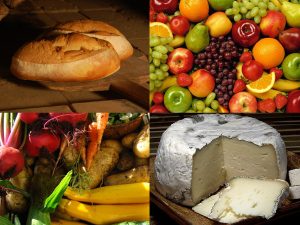Our new report, “A Matter of Scale”, highlights how a diverse and vibrant sector of small farms is providing employment, attracting new entrants and incubating entrepreneurs. A survey of 69 holdings of 20 hectares or less, undertaken by the Landworkers’ Alliance in conjunction with the Centre for Agroecology, Water and Resilience at Coventry University, provides a preliminary insight into the diversity, productivity, financial viability and multifunctional benefits offered by such farms. The report is accompanied by five short films about key themes arising from the research.
Productivity.
A recent BBC survey revealed that “over 70% of British growers say they would reduce their UK operations if access to key labour markets is restricted post-Brexit”. However, the “A Matter of Scale” report offers an alternative vision for the future of UK horticulture.
Many young people are attracted to the more varied, meaningful and skilled work offered by small scale organic and agroecological holdings, as opposed to industrial farm work which is perceived to be monotonous. Aspiring new entrants are motivated to learn about systems which address environmental challenges such as climate change, soil depletion and biodiversity loss, and prefer the friendlier atmosphere of small farms and market gardens, where they can learn a variety of skills. The report shows how organic market gardens, many of which are less than 5ha (the threshold below which Basic Farm Payments are not currently available), are able to produce yields of certain crops that exceed those of non-organic growers.
Multi-functional benefits.
A dramatic increase in the number of small, agroecological market gardens, especially in peri-urban areas, could help reduce the trade gap for fruit and vegetables, while providing pleasant and meaningful all-year-round employment for local people and a thriving local economy.
Furthermore, respondents in the survey suggested that the health and environmental advantages of vegetables and fruit being produced near to point of consumption and sold directly include freshness, less waste and less energy used in transport. Other key findings include:
• Compared to average UK farm incomes the ‘A Matter of Scale’ (AMOS) sample were performing well financially. 78% of the sample was receiving no farm subsidies, and subsidies made up less than 20% of the income for 19% of those who were receiving subsidies.
Financial viability.
• Most of the farms were adding value either by direct marketing or processing their produce into cheese, juices or preserves. Vegetable box schemes, farmers’ markets and community supported agriculture schemes enable better incomes, while building customer trust through provision of fresh and sustainably produced food.
Employment.
• Barriers to productivity included: lack of capital to invest in equipment and infrastructure, meaning the efficiency of some holdings was less than optimal; affordability of land and accommodation; and lack of technology suitable for small-scale farmers.
Until now, little research has been conducted into the productivity and viability of small-scale, agroecological farms in the UK. This study shows that they deserve closer attention by both policy makers and academics as they simultaneously address many of the challenges facing twenty-first century food production, including UK provision of vegetables and fruit, fulfilling employment opportunities, reduction of greenhouse gas emissions and food waste, and the re-building of rural communities.
Barriers to Productivity.











2 Comments
Feeling for these pioneers. But fight the bureaucracy! Make your plight more widely known. The guy sitting in the shed talking about irrigation and mains water didn’t say how much water he could collect from his roof to use for that purpose. Don’t only look for volunteers who can work,on the land but those who would do your admin for veg…
It’s the way forward, definitely. What can we do to lobby government? Surely the Brexit situation must give you some clout?
A really good article although the videos are a bit lacking in facts. The reports linked to are well worth reading, though.
Basically it proves that it is possible to farm sustainably and economically on a small scale despite the dice being weighted in favour of conventional, large scale farming. I’d like to see subsidies reduced for large farmers and increased for small and micro farms.
I can’t see Brexit helping that cause though – the government and DEFRA are far too cosy with big agro-biz and large landowners.